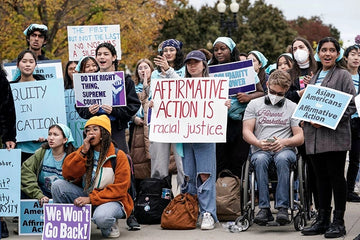MY STREAMING THOUGHTS
on Affirmative Action and the Legacy of Inequality
The recent Supreme Court ruling against the use of race as a factor in college admissions has sent shockwaves through the nation. The decision, which effectively strikes down the practice of affirmative action, has been met with a mix of reactions, ranging from approval to dismay. As someone who has closely followed the developments, I am deeply concerned about the implications of this ruling and the potential regression in the progress we have made since the 1960s.
The Supreme Court's ruling was based on two cases brought by Students for Fair Admissions against Harvard University and the University of North Carolina. The group argued that the universities' admissions policies, which took race into account, were unconstitutional and disadvantaged white and Asian-American applicants. The court ruled in favor of Students for Fair Admissions, stating that the universities' practices did not have a good enough justification for using race in admissions. As Chief Justice John Roberts wrote in his majority opinion for the court, "Students must be treated based on his or her experiences as an individual—not on the basis of race. Many universities have for too long done just the opposite."
However, this ruling seems to overlook the historical context and the purpose of affirmative action. Affirmative action was established to rectify the systemic racial discrimination that has plagued our society for centuries. It was a means to ensure that students of all races had a fair shot at higher education, which is a crucial stepping stone to social mobility.
The current Supreme Court, with its conservative majority, appears to be on a mission to undo the progress we have made in the realm of civil rights. This "Make America Great Again" mentality, fueled by white fear of a changing America where cis-het white men no longer hold the majority of power, is causing a frenzy in our current politics. This attack on affirmative action does nothing to address the role of legacy admissions, which disproportionately favor white students.
Legacy admissions, where students are given preference if their parents or other family members attended the same institution, may not appear to be racially motivated on the surface. However, considering the historical context, it becomes clear that this is not the case. For much of our history, Black students were systematically denied admission to these institutions, preventing them from establishing legacies. Therefore, to argue that legacy admissions are not a race-based policy is disingenuous at best.
Furthermore, the complaints against the universities by Students for Fair Admissions seem to ignore the fact that diversity in higher education is not just about numbers. It's about providing an environment where students from all walks of life can learn from each other's experiences. It's about preparing students for a diverse world where they will need to interact with people who are different from them.
Justice Sonia Sotomayor, in her dissent, highlighted the importance of this, stating that "race does correlate to some experiences and not others. If you’re Black, you’re more likely to be in an underresourced school. You’re more likely to be taught by teachers who are not as qualified as others. You’re more likely to be viewed as having less academic potential."
The Supreme Court's ruling against affirmative action is a step back in our progress towards equality. It fails to address the systemic issues that affirmative action was designed to combat, and instead, seems to uphold policies that perpetuate racial inequality. As we move forward, it is crucial that we continue to fight for policies that promote diversity and equality in higher education and beyond.

